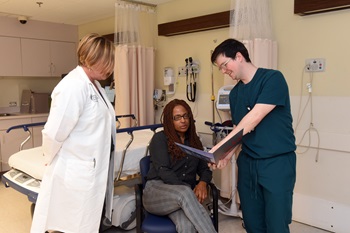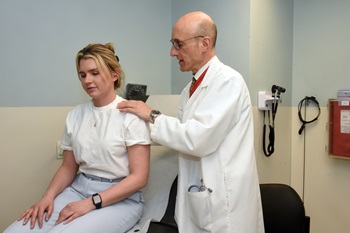Educational Goals & Competencies
 Our residency education mission is to cultivate an educational environment which provides the full spectrum of learning opportunities in clinical radiation oncology, medical physics and radiobiology. Our flexible curriculum is designed to enable a resident to optimize their learning experience throughout their four years of training. It is our expectation that upon the completion of the program a resident will be an outstanding Radiation Oncologist, capable of making an immediate impact in either an academic or community practice setting.
Our residency education mission is to cultivate an educational environment which provides the full spectrum of learning opportunities in clinical radiation oncology, medical physics and radiobiology. Our flexible curriculum is designed to enable a resident to optimize their learning experience throughout their four years of training. It is our expectation that upon the completion of the program a resident will be an outstanding Radiation Oncologist, capable of making an immediate impact in either an academic or community practice setting.
Upon graduation, the resident should demonstrate an ability to practice independently, with achievement of the ACGME required competencies noted below.
- Patient care (PC) that is compassionate, appropriate, and effective for the treatment of health problems and the promotion of health.
- Medical knowledge (MK) about established and evolving biomedical, clinical, and cognate (e.g., epidemiological and social-behavioral) sciences and the application of this knowledge to patient care.
- Practice-based learning (PBL) and improvement that involves investigation and evaluation of their own patient care, appraisal and assimilation of scientific evidence, and improvements in patient care.
- Interpersonal and communication skills (ICS) that result in effective information exchange and collaboration with patients, their families, and other health professionals.
- Professionalism (P), as manifested through a commitment to carrying out professional responsibilities, adherence to ethical principles, and sensitivity to a diverse patient population.
- Systems-based practice (SBP), as manifested by actions that demonstrate an awareness of and responsiveness to the larger context and system of health care and the ability to effectively call on system resources to provide care that is of optimal value.
Aims (Goals and Objectives)
- To provide a robust and diverse educational experience for clinical training in radiation oncology, with the comprehensive understanding of oncologic principles, treatment techniques, dosimetry, physics, and radiobiology.
- To provide an environment that promotes clinical, basic science and medical physics research opportunities in oncology, with access to a diverse group of faculty mentors to choose from with associated disease site, basic science and radiation modality/technology expertise.
- To graduate residents with strong interpersonal and communication skills by fostering a multidisciplinary approach to patient care through participation in cancer care in both the academic and community care setting that brings together highly specialized medical oncologists, surgical oncologists, pathologists, radiologists and other associated cancer care specialists.
- To allow curriculum flexibility that enables trainees to maximize their individual learning experiences such that they feel best prepared for success in the subsequent academic/community setting they desire to make a positive impact on.
- To graduate residents who practice compassionate care and who deliver high quality patient care.
- To graduate residents who successfully complete the board certification process in radiation oncology.
Evaluations of Performance
Our program strives to evaluate resident performance through a number of avenues. These include but are not limited to: meeting competency-based goals and objectives for each assignment at each training level; clinical acumen; ACR in-training exam scores; evaluations by faculty on each rotation; 360-degree evaluations by multiple members of the various divisions in the department; attendance at all departmental conferences and appropriate tumor boards; and ability to work effectively with peers and co-workers in the department.
Our program has integrated the ACGME milestone competencies into our curriculum. Please visit ACGME for specific details on the ACGME program requirements for Graduate Medical Education in Radiation Oncology.
